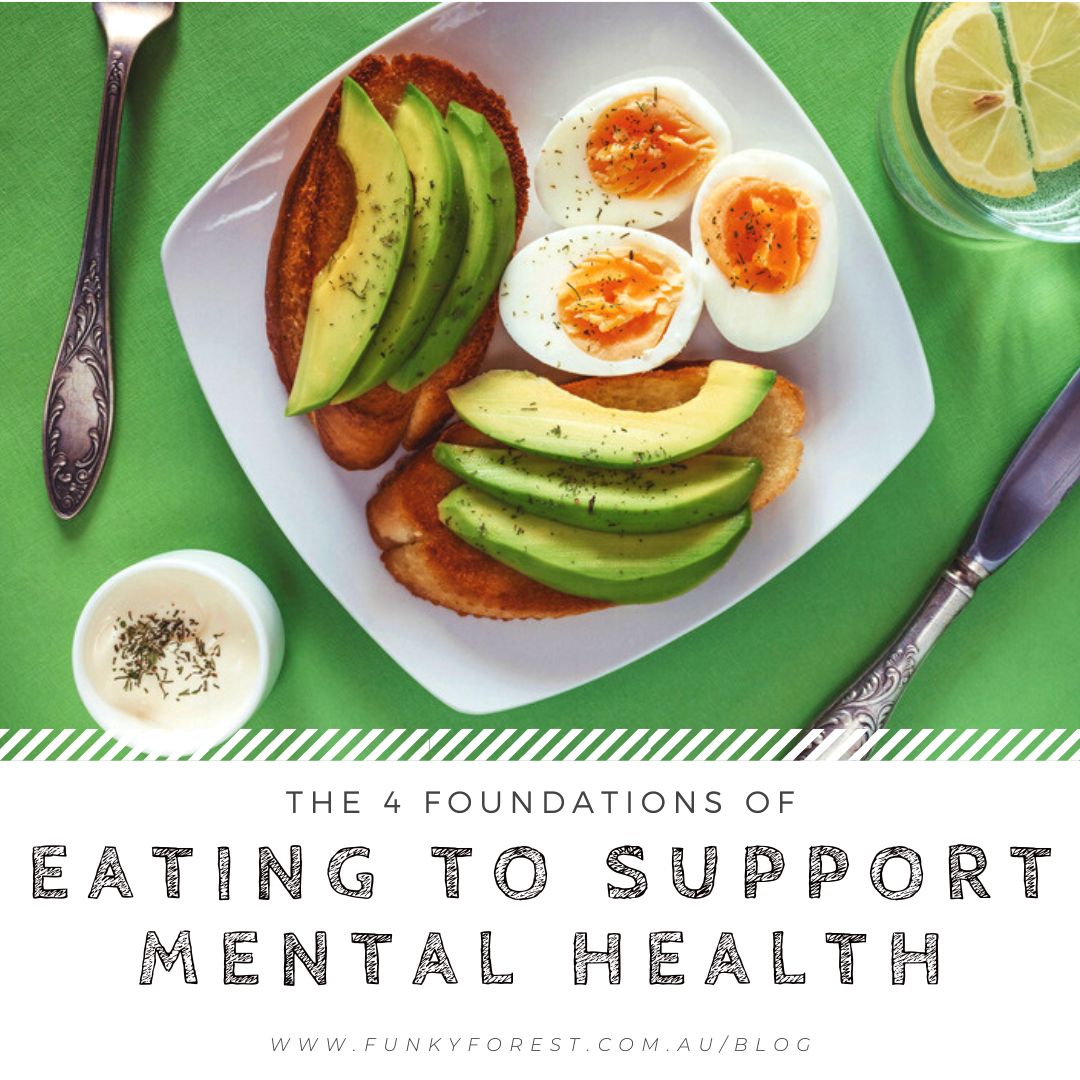We know there's a huge connection between how you eat and your mental health, with studies showing that dietary improvement is one of the most effective and accessible treatment strategies for managing depression (2). Wild-caught salmon, matcha, blackberries, cacao, probiotic foods, and turmeric are the mental health superfoods du jour. And "cutting out sugar and anything processed!" is a catch cry in the wellness worlds I inhabit.
But the thing is, SO many people I see in clinic are under eating or cutting out foods unnecessarily. It's this that's leaving them in a worse state of mental health, rather than not eating aaaallll the superfoods.
When it comes to mood support, rather than ask yourself, "What should I be taking away?", consider, "What can I add to my diet?"
Here are the four big basics of eating to support mental health that need to be in place before things like matcha and curcumin can actually be of benefit:
1. Regular eating
For some people, skipping meals temporarily provides a surge of energy and sharper focus. This "energy boost" is really just the up-regulation of stress hormones (adrenaline and cortisol) by your body in response to perceived famine. Your body is screaming at you to go and find food, and the energy and hyper-focus that follows prolonged fasting are meant to help you to go hunting and/or foraging so that you can feed your body! Not to push a little harder at work or in the gym. Besides the stress hormone injection, the effects of an irregular dietary pattern on glycaemia (blood glucose regulation), immune activation, and the gut microbiome likely disrupt mood (2).
So whether I'm working with a client in recovery from a severe eating disorder, or with someone who skips breakfast and is experiencing mood crashes later in the day, addressing meal regularity is usually the first place I start.
2. Adequate dietary fat
3. Adequate carbohydrates
Low-carb intake contributes to brain fog, depression, fatigue, crappy sleep, and muscle breakdown. I see inadvertent carb-phobia in so many of my female clients (especially physically active women and newly postpartum mums), it's almost surprising when someone is eating enough low GI, slow-burning carbohydrate! For best functioning, your body needs ~50% of your daily intake as carbs. I know, I know... that's a lot more than your average paleo or keto coach suggests. But it's what I've seen work best in female clients, especially busy, active, pre-menopausal women. Do your body, brain and moods a favour and carb up.
4. Adequate protein
Protein should be between 15-20% of your total daily intake. I frequently see clients consuming well over this, sometimes eating two or three times their actual requirements! When you're eating this much protein, it is likely to be displacing carbohydrate and fat in the diet. Because it's been near-eroticised in fitness culture protein is the sexy macro, and many of my clients have a "more is better" attitude - often at the detriment of their sleep, mood and - ironically - performance in the gym. My challenge to these folks is to up their carbs and fat and watch their mental health improve!
Once these fundamental pieces of the puzzle are in place, then sure let's get excited about wild-caught salmon, probiotics, and turmeric! But unless we're already eating regular meals with adequate calories and macronutrients, adding superfoods to improve your mental health symptoms is a mere drop of matcha tea in the ocean.
Benefits of adequate eating for mental health
- Alleviate anxiety
- Reduce severity of depressive episodes
- Improve sleep
- Support more stable moods
- Recover from eating disorders
- Reduce the risk of nutrient and antioxidant deficiencies when taking mood-altering medications like SSRIs and anti-psychotics
- Improve focus and reduce limiting behaviours (including in ADHD and other forms of neurodivergence)
- Replete nutrients in alcohol and drug addiction recovery
- Support mental health during hormonal transitions such as PMS, postpartum and peri-menopause
If you're looking for guidance on how to support your mental health, I'm offering 20% off all naturopathic appointments for the rest of 2023, limited spaces available (limited because I'm a busy mum and need to look after my own mental health too!)
Casey
References
- Johnson, J., Weissman, M. M., & Klerman, G. L. (1992). Service utilization and social morbidity associated with depressive symptoms in the community. JAMA, 267(11), 1478–1483.
- Jacka, F. N., O'Neil, A., Opie, R., Itsiopoulos, C., Cotton, S., Mohebbi, M., Castle, D., Dash, S., Mihalopoulos, C., Chatterton, M. L., Brazionis, L., Dean, O. M., Hodge, A. M., & Berk, M. (2017). A randomised controlled trial of dietary improvement for adults with major depression (the 'SMILES' trial). BMC medicine, 15(1), 23. https://doi.org/10.1186/s12916-017-0791-y



































 RSS Feed
RSS Feed



